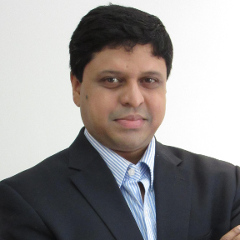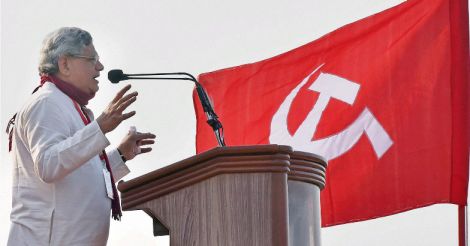My memories of the Emergency are of disparate descriptions of the 'loud thuds' that accompanied nocturnal visits by the Kerala police. I was too young to remember. Yet, vague memories have a strange capacity for resurfacing years later. One such is the constant warning by my feisty maternal aunt, an influential CPM women’s wing leader, about our CPI neighbors, who were her own aunts, uncles and cousins.
My 80-something grandmother, an otherwise demure lady, occasionally swore at them, in private, of course. Later she had told me that the Emergency was, for her, all about watching her CPI neighbors, the spies of the Congress, as she called them. When my father -- then a tall leader of the CPM in Kerala -- finally came home from exile after Emergency was lifted, it appeared to me that he had returned after decades, though it was just two years. When he passed by the neighbors’ home, he would offer them a winning smile. His flourishing mustache was missing, but still I was happy that the neighbors looked crestfallen and silent. Did they smile back? I don’t remember.
For me as a child, CPI was a bad word. Which was why a few years later when CPI, until then a Congress ally, was brought under the CPM-led LDF's fold I was shocked. But the biggest shock was my father’s demise that preceded it. He had been bitten by a rabid dog during Emergency and couldn't avail of treatment in Kerala where there was an arrest warrant against him under MISA. He went, as they used to say, 'underground', like many other opposition leaders of the time. He managed to travel to Madras from where he was advised to head for Bombay because Tamil Nadu wasn't safe for political leaders such as him. In Bombay, he is said to have received good treatment, but it was too late: he returned with what was diagnosed as heart ailment. But that didn’t stop him from resuming his frenetic political activism, further fueled by his discoveries of the Congress’ excesses and atrocities on the common citizen during the Emergency.
A year later, after a rousing speech to his hundreds of supporters in our hometown of Kannur, he came home, clutched his chest and collapsed on the floor. My young mother watched in horror as her husband of six years and father of her three small children died suddenly before she could even call for help. He was 41. I was five.
I was only amused when Yechury -- as the new general secretary of the party my father and several other members of my family had once worked for -- joined hands with the Congress in West Bengal, going against the CPM's political tactical line. Now that I am no longer a child given to innocent assumptions and grievances, and because I understand the myriad compulsions of politics, especially in West Bengal, I hoped that the alliance, which had been peddled to Kerala comrades as an electoral understanding, would help the CPM in Bengal regain lost ground, at least in a few key areas where the party's cadres have been hunted down, tortured and killed, often inch by inch, by cantankerous Trinamool Congress workers, who are nothing better than a bunch of ruffians in politicians’ clothing.
The CPM, which had been in power in West Bengal for 34 straight years until 2011, did have connections with criminals; yet the criminalization of politics that you see in today's Bengal has the characteristics of a Colombian drug cartel. So much so that Trinamool Congress leaders fight one another to get 'licenses', an unofficial nod from the party leadership, to run mafia groups in a particular area. Only those with such ‘licenses’ could supply raw materials for construction, vegetables, fish and so on in a certain locality. They hit pay dirt thanks to this association with the ruling party. Sometimes, low quality building raw materials sourced from these gangs led to tragedies, like the caving in of the Girish Park flyover which killed scores of people this year.
While on a tour of West Bengal ahead of the five-phased polls this year, I realized that the Congress-CPM alliance could have taken shape first as a natural alliance at the grassroots level before the state leadership formalized it after placing the proposal for a poll pact before the higher panels of the party. Finally, they got the approval of sorts for an “understanding” or a “strategic tie-up” to defeat the Trinamool Congress.
The reality on the ground was entirely different. The Congress and CPM, arch rivals who had fought on the streets of Kolkata and elsewhere before and after Emergency, had come together almost like Siamese twins. From West Midnapore to Bhirbhum and the Sundarbans to wherever else I had traveled, the camaraderie at the lowest levels was there for all to see. CPM was at the forefront of the campaign for Congress candidates. Several senior leaders of the CPM, who had cut their teeth in politics as die-hard and rabid anti-Congress activists, shared the dais with Congress stalwarts, some of whom had chased them like crusaders after the Holy Grail during Emergency. It is impossible that they could ever forget the murderous politics of the Congress-led SS Ray government of the time. Yet they chose to forgive for the sake of, what they still argue is, their survival in a state that was for decades the CPM's biggest fortress.
While aligning with the Congress, the CPM had many things in mind: Mamata Banerjee’s Trinamool Congress would desist from using violent methods against the jot, or tie up. The Congress would fetch votes, as it did first in the Siligiri local polls, which soon earned a name as a new and effective election model to combat Mamata. The CPM also bet big on the mathematical calculus of the two fronts: that the 30 per cent vote share of the LF and 9 per cent of the Congress would equal 39 per cent of the Trinamool Congress. They discounted the fact that the atrocities of the Left of the past several decades were still fresh in public memory. Worse, a section of the Congress in the state wasn't pleased about the alliance.
After the poll setback, Muhammed Salim, politburo member and a Yechury loyalist, told me that while the transfer of CPM votes to the Congress was complete, a reverse transfer did not happen in many seats. He said there could be reasons for it and that the party would look at it. Before the polls, he was one of the most optimistic of the lot. Though the likes of party veteran Biman Bose would only say "let's see," Salim offered that Trinamool Congress wouldn't win more than 140 of the 294 seats, thanks to huge fissures he anticipated in Mamata’s Muslim vote base.
Salim was overly optimistic, but he was not alone. Leave aside Biman Bose and a few others, most others, especially Yechury, according to people close to the matter, hoped to pull off a good show in West Bengal. The cadres as well as leaders from West Bengal were relatively naive about the larger political ambitions of the alliance. According to a senior West Bengal leader, there may have been more to it than meets the eye. “In hindsight, I mean,” he says. Nonetheless, without doubt, for the state’s grassroots workers it offered a buffer against wily Trinamool goons.
For his part, Yechury apparently anticipated greater gains. The general secretary of the party never answers questions I ask and therefore I wouldn't know what his explanations are about this suggestion by a few of his colleagues in the Politburo. At least three senior CPM leaders I spoke to say that Yechury wanted to consolidate his power within the party if the results came out the way he had expected them to. He was hoping for a good show in Bengal (perhaps just short of a win) and a slender margin for the Left Democratic Front in Kerala. Such a cocktail of a result would have emboldened him to anoint VS Achuthanandan, his associate, as the next CM of Kerala. He could have easily reined in Pinarayi Vijayan, VS’ rival, by warming up to the new leadership in the state. In the process, he would have also cut to size his arch rivals in the politburo, Prakash Karat and S Ramachandran Pillai.
The political alliance in West Bengal, in hindsight, may look like a blunder. One would never fully know the extraneous factors that contributed to the final tally. Yet, there was something very natural about the alliance in that it enabled the coming together of grassroots workers of the CPM and the Congress, both persecuted and hounded by Trinamool workers. On the other hand, the alliance was a gross violation of the party line.
After coming under attack at recent high-level meetings of the party, West Bengal comrades are now crestfallen and have plunged into self-pity. Of their dreams have come nightmares. There is also a sense of wounded pride. After all, a victory at the hustings would have justified the violation of the party line, which, in all practicality, is supposed to be amended according to ground realities. In the case of West Bengal, I believe, drastic measures were required to keep the party stay afloat following its rout in the 2011 elections. It is true that the party had decided to keep equal distance from the BJP and the Congress and, in fact, from parties of the former Third Front that are thick with corporates. Why is then the CPM in an alliance with the NCP in Kerala? It is a party whose leader Sharad Pawar has his name in the mud. Several NCP leaders have alleged links with underworld dons, including Dawood Ibrahim himself.
The arguments will go on.
But the question is: what makes Yechury far more desperate than the CPI leaders who had advocated an alliance with the national bourgeoisie, which is represented by the Congress, in the early 60s? For comrade SA Dange and others, it was perhaps the charisma of Indira Gandhi that was the lure which forced a tie-up. Renowned columnist MJ Akbar has recently touched upon this subject. After all, Mrs Gandhi had power as well as tremendous appeal. None other than legendary Nobel Prize-winning author Gabriel Garcia Marquez had said of her, "What a combination of delicate femininity and sheer power."
Akbar was shocked when he learned that Yechury got swayed by someone like Rahul Gandhi. What the acclaimed columnist, who is now a BJP lawmaker, may not have factored in is that while the CPM-Congress grassroots cadres may have had legitimate reasons to bond, the new CPM general secretary has a grotesque preoccupation with factionalism. Over the past decade, Yechury has zealously used to his advantage the infighting between VS and Pinarayi in Kerala to poke Prakash Karat and for one-upmanship, disregarding the strategic need for party unity in favor of personal gains. Now that the turbulence in Kerala has receded, thanks particularly to a helpless situation that has emerged following the resounding reverse in West Bengal, Yechury seems to be missing a much-needed opportunity to fish in troubled waters, a strategy that has contributed in no small measure to his political career.
Childhood memories of betrayal and loss still linger, but I feel the leaders of the CPI in the 60s and the 70s who chose to align with Congress, sleep and steal and betray, had a greater stature and sense of political worth.
(The writer is the executive editor of Open Magazine and author of War Room: The People, Tactics and Technology behind Narendra Modi's 2014 Win)

























